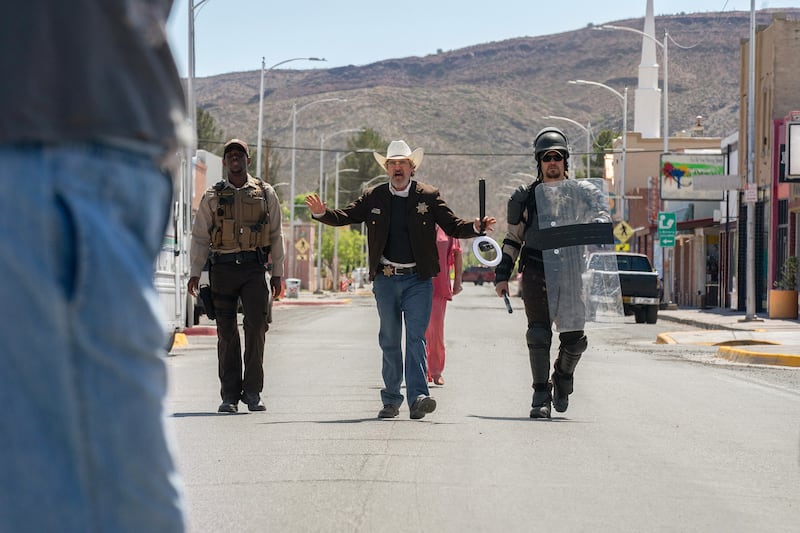No one ever accused Ari Aster of playing it safe, and following the bats--t Oedipal acid trip of Beau is Afraid, the writer/director returns with a furious and frenzied Western snapshot of our COVID nightmare with Eddington.
In theaters July 18 (following its premiere at the Cannes Film Festival), the Hereditary and Midsommar auteur’s latest takes a trip back in time to the unpleasant days of late May 2020 to paint a microcosmic portrait of the pervasive hate, derangement, delusion, and daffiness that ran rampant in America during the early stages of the pandemic.
Taking aim at the left, the right, and every mad thing in-between, it’s a fierce and funny provocation designed to p--- off everyone along the political spectrum, and a caustic satire of a country poisoned by a plague that supercharged the diseases lying dormant in its veins.
In the tiny middle-of-nowhere New Mexico town of Eddington, Sheriff Joe Cross (Joaquin Phoenix) stubbornly refuses to don a mask because of his asthma, his objection to its illogical enforcement—a fellow scolding cop, for example, wears his below the nose, rendering it ineffective—and his pro-freedom convictions.
This puts him at odds with Mayor Ted Garcia (Pedro Pascal), who’s running for re-election and who bristles at the sheriff’s obstinance regarding state COVID mandates. The pandemic isn’t, however, the only source of tension between the two, since years earlier, Ted went on a couple of dates with Joe’s unstable shut-in wife Louise (Emma Stone) and, for his troubles, was (and still is) accused of having dumped her after leaving her with an unwanted pregnancy that she subsequently terminated.

This is, at least, the narrative espoused by Louise’s mother Dawn (Deirdre O’Connell), an unreliable nutjob whose mind is saturated with online crackpot theories. Joe wishes Dawn would move out but, thanks to COVID, he and Louise are stuck with her—an issue that’s as vexing as Louise’s disinterest in sex.
Making matters more high-strung, George Floyd-inspired social-justice rallies are sweeping the nation, bringing with them riots that unnerve Joe and his white deputy Guy (Luke Grimes) and, to a lesser extent, his bitcoin-loving Black deputy Michael (Michael Ward). The trio is convinced that unrest is destined to come to the sparsely populated Eddington, and if Aster’s film paints them as thinly veiled intolerant nitwits, they’re also not totally off base.
Joe is soon driving headfirst into a protest spearheaded by white blonde Sarah (Amélie Hoeferle), whose tirades about “stolen land,” “defund the police,” and “white privilege” are as dialed-to-11 hysterical as her conservative counterparts’ conspiratorial ramblings—albeit not to Brian (Cameron Mann), who insincerely parrots her Black Lives Matter dogma in an attempt to woo her.
Eddington begins at a simmer but quickly transforms into a boiling cauldron of prejudice, paranoia, and performative insanity. Aster’s camera flip-flops between POVs and media filters (including Instagram and Twitter), and it goes topsy-turvy in tune with its off-kilter action. That additionally involves Ted’s strife with his son Eric (Matt Gomez Hidaka), who competes with buddy Brian for Sarah’s affections, as well as Louise’s interest in Vernon Jefferson Peak (Austin Butler), an anti-establishment loon who tells tales about his childhood abuse (and the paternal pedophilic cabals behind it) which even Joe finds ridiculous.
In Butler’s smarmily charismatic cultist, Aster interjects some PizzaGate-style craziness into his combustible mix. Similarly, Ted’s benefactor Warren (Robert Mark Wallace)—who supports a controversial Solidgoldmagikarp data center being constructed in town—allows the material to nod toward Republicans’ George Soros infatuation.

Eddington is like all of the United States’ COVID misery and madness condensed into one locale and story, and the discomfort it produces is intentional. At every turn, Aster throws some recent-past lunacy in our faces, and the director’s bombardment escalates once Joe, driven mad by the current climate both at home and in his beloved community, decides to run for mayor.
Instead of assuaging his frenzied heart and soul, this act makes things worse, including with Louise, who trades in one unbalanced man for another, and with regards to his job as the protector of the peace—of which there is precious little, courtesy of nasty accusations and physical encounters that presage disaster.
The personal and the political are coiled around each other’s necks in Eddington, choking the life out of everything and everyone, and Aster refuses to take sides, locating in Joe and Ted’s feud the extremist folly of both liberals and conservatives.
COVID is the catalyst for this scathing saga and yet from the outset, the filmmaker suggests that it didn’t create these ugly frictions, belief systems, and manias so much as it provided an opportunity for them to fully emerge, flourish, and spread. From Phoenix’s loco lawman and Pascal’s arrogant politico to Grimes’ dim-witted and narrow-minded cop and Hoeferle’s self-righteous and hypocritical activist, Eddington is awash in amusingly awful caricatures whose perspectives and behavior reflect a citizenry ill with fanaticism.
Scored with Hitchcockian menace by Daniel Pemberton and Bobby Krlic, Eddington serves up a toxic stew that’s still the main course in 2025 America, and its humor (complete with low-hanging fruit gags like Joe’s car sign “Your Being Manipulated” and Ted playing Katy Perry’s “Firework” at a fundraiser) comes from pitching the stomach-churning proceedings in an absurdist register.

The homeless man who roams Eddington resonates as no sicker than the rest of the enclave’s residents, and in its second half, Aster’s film devolves into murder, duplicity, and betrayal, along with prolonged skirmishes with Antifa commandos intent on exacting payback against Joe for his right-wing crimes. Even at its most cartoonishly censorious, it bludgeons the funny bone until it elicits queasy laughter—the only reaction, ultimately, to mayhem that’s barely more exaggerated than reality.
Like Beau is Afraid, Eddington goes to outrageous lengths to make its point and then refuses to dial itself back, such that in its third act, it boasts multiple incidents that might have sufficed as a conclusion.
Yet Aster’s desire to barrel forward into zanier and scarier terrain, and to close on a somewhat abrupt and unresolved note, isn’t a sign that he doesn’t know when (or how) to quit; rather, it’s the final punchline for a bleak comedy which recognizes that the pestilence of our present-day condition wasn’t cured by the end of the pandemic—it continues to metastasize in unhinged and fatal ways.






